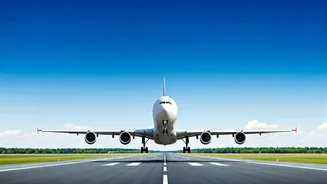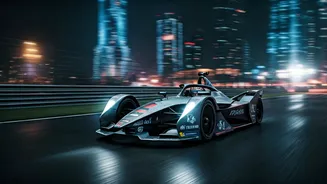Airline Excellence Defined
The process of determining the world's best airlines involves a comprehensive evaluation based on multiple factors. These encompass safety records, which
reflect an airline's commitment to passenger and crew well-being through rigorous operational standards and maintenance practices. The quality of in-flight service is also crucial, encompassing everything from the comfort of seating and the variety of entertainment options to the attentiveness and professionalism of the cabin crew. Furthermore, punctuality plays a significant role, examining how reliably airlines adhere to their schedules, thus impacting passengers' travel plans. Another essential consideration is the overall customer experience, which covers the ease of booking, check-in processes, and the efficiency of handling any issues that arise during travel. Finally, innovation in areas such as technology, sustainability efforts, and route networks is also taken into account. These elements combined offer a holistic view of airline performance, thus allowing for a fair and comprehensive comparison to determine the leading carriers.
Leading Airline Showdown
In the highly competitive aviation industry of 2025, several airlines consistently distinguished themselves through exceptional performance. Qatar Airways was widely acknowledged for its luxurious offerings, outstanding service, and global reach. Similarly, Japan Airlines garnered praise for its dedication to punctuality, superior cabin service, and emphasis on passenger comfort, reflecting its deep-rooted cultural values. Singapore Airlines was recognised for its innovative approach, offering an outstanding passenger experience, state-of-the-art technology, and a commitment to sustainability, thus setting industry benchmarks. These airlines, along with others such as Emirates and ANA, often top the rankings. However, specific airline performances shift annually, dependent on various factors, including evolving passenger expectations, external challenges, and continuous investment in their services and infrastructure. Therefore, the top positions in global airline rankings shift each year, representing the ongoing dynamism and competition within the aviation sector.
Indian Airline Presence
The question of whether Indian airlines made it onto the list of top airlines in 2025 is a critical one for the Indian aviation sector. The representation of Indian airlines on global rankings is a measure of their competitiveness and ability to meet international standards. Often, Indian carriers confront many obstacles, including tough competition from established international airlines, infrastructural constraints, and sometimes, regulatory frameworks. Despite these issues, a strong showing by Indian airlines could underscore substantial advancements in service quality, operational efficiency, and overall customer satisfaction. The presence of Indian airlines in these international rankings serves to boost their global reputation, attracting both international passengers and investment. It also encourages domestic airlines to constantly improve their offerings and match the standards of the leading global carriers.
Ranking Evaluation Criteria
The evaluation criteria used for ranking airlines in 2025 involved several key aspects. Customer satisfaction plays a huge role and depends on the experiences passengers have when they fly with the airline, including comfort, service quality, and overall enjoyment of the flight. Another important factor is operational performance, reflecting the airlines’ punctuality, on-time performance, and ability to handle delays or disruptions. Additionally, safety is a priority, considering each airline’s safety record. Moreover, service quality evaluates the features of the airline, such as its in-flight entertainment, food, and the attentiveness of the cabin crew. Furthermore, airlines' investments in sustainability initiatives, reducing carbon footprint, and promoting eco-friendly practices are also considered. Finally, the airline's network and overall market share are also factors in determining its global position. By taking these factors into account, the rankings provide a clear insight into the best airlines globally, guiding travelers to choose the best and most reliable flight options.
Importance of Rankings
The airline rankings play a critical role in the aviation industry, affecting both airlines and passengers. For travelers, these rankings represent a valuable tool to make educated choices by offering a reliable basis for choosing which airline is best for their requirements. Moreover, these rankings also help encourage competition, pushing airlines to constantly improve their services, which enhances overall standards within the industry. Airlines themselves use rankings to gauge their performance in comparison with competitors, identifying key areas for improvement and making strategic adjustments to enhance their offerings. Positive rankings increase an airline's global visibility, attracting new customers and investment. Negative rankings highlight areas that need attention, encouraging them to address shortcomings to uphold or enhance their market position.
Looking Ahead in Aviation
As the aviation industry continues to evolve, several trends are poised to impact future airline rankings and passenger experiences. Sustainability will become increasingly important as airlines adopt eco-friendly technologies and practices to reduce their carbon footprint. The integration of technology will transform various aspects of air travel, from booking and check-in to in-flight entertainment and personalized services. Passenger experience will continue to evolve, with more emphasis on comfort, personalized service, and innovative in-flight offerings. Furthermore, competition among airlines will remain intense, pushing them to improve efficiency, expand their networks, and provide greater value to passengers. With these trends, the global airline rankings will reflect an ever-changing landscape, where airlines strive to stand out through innovation, customer-centric approaches, and a commitment to sustainable practices.

















